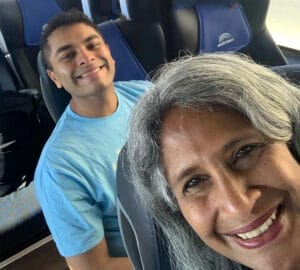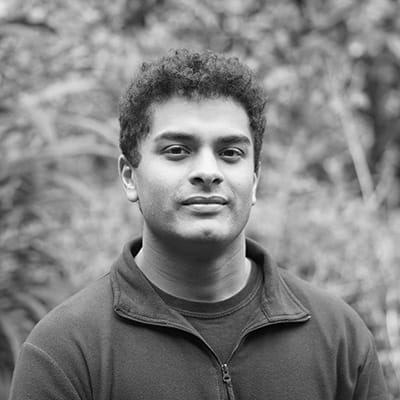Part of a multifaith human rights delegation to Palestine, I was refused entry to the West Bank by Israel. I was detained, questioned, and harassed for five hours, during which time they confiscated all my possessions including my laptop and phone which they made me unlock and pored through. I was screamed at, laughed at, led through corridors, not allowed to the bathroom, eventually labelled a public security threat, photos and fingerprints put on file, and removed back to Jordan with my phone blocked, my bank card not working, and twenty dinars in my pocket. I am now back home, safe and sound, in London. Palestinians don’t get to go home.
My experience – bad, but a drop in the ocean of Palestinian blood – brought me face-to-face with the Israeli borders and barriers system. The state department that forced me to sign a document I wasn’t allowed to read is unashamedly called the Population & Immigration Authority. This is a system of degradation, dehumanisation, and destruction of Palestinian-ness. Its brutality is intentional and its intent is genocidal. I have had my own journey processing what happened to me. Yet what happened to me is insignificant in the face of what it means to be Palestinian or to live in any country neighbouring Israel.
 Over my five hours at the Allenby Bridge border crossing facility, I had heartwarming and heartbreaking interactions with many Palestinians detained alongside me. They were all calm and cheery – seasoned detainees. Experiencing for the first time this kind of fear and isolation, this kind of powerlessness at the hands of a seemingly infinite state, I wasn’t initially in the mood to talk. But the Palestinians drew me into conversation with unflappable friendliness that I will never forget.
Over my five hours at the Allenby Bridge border crossing facility, I had heartwarming and heartbreaking interactions with many Palestinians detained alongside me. They were all calm and cheery – seasoned detainees. Experiencing for the first time this kind of fear and isolation, this kind of powerlessness at the hands of a seemingly infinite state, I wasn’t initially in the mood to talk. But the Palestinians drew me into conversation with unflappable friendliness that I will never forget.
There was a 17-year-old girl who was excited to speak with me, perhaps as I was the next youngest person there (I’m 27). When she told me she was at An-Najah National University, the largest university in Palestine, I replied, “you’re at university? But you’re 17, you must be extremely intelligent!” Straight-faced, she said, “yes”, nodding earnestly. I chuckled, wondering if the phone we were speaking through had mistranslated what I said, but she followed up, “my overall mark was 96 last year!” I told her how impressed I was, and she complained that she would have gotten an even higher mark if it weren’t for pesky mathematics.
 The next day, on thirty minutes of sleep, I managed to get back to London and saw the accounts of the new Israeli “military operations” in the northern West Bank, targeting several cities including Jenin, Tulkarem, Tubas, and Nablus. An-Najah National University is based in Nablus. I hope my 17-year-old friend is ok. She had just gone back for the new term. Her mother, who lives in Jerusalem, at one point left to try and find me a snack as she saw me shivering and tiring. I never thought a Mars bar could be so meaningful. I hope she is ok too. I think about them every day. Weeks on from my experience I still can’t sleep and have the following words in my mind every night as I sit on the edge of my bed: I hope they are not dead.
The next day, on thirty minutes of sleep, I managed to get back to London and saw the accounts of the new Israeli “military operations” in the northern West Bank, targeting several cities including Jenin, Tulkarem, Tubas, and Nablus. An-Najah National University is based in Nablus. I hope my 17-year-old friend is ok. She had just gone back for the new term. Her mother, who lives in Jerusalem, at one point left to try and find me a snack as she saw me shivering and tiring. I never thought a Mars bar could be so meaningful. I hope she is ok too. I think about them every day. Weeks on from my experience I still can’t sleep and have the following words in my mind every night as I sit on the edge of my bed: I hope they are not dead.
When I asked the 17-year-old girl if this had happened to her before, she laughed kindly at my silly question and replied, “last time was three hours”. When a man asked what was happening to me, to which I replied that I didn’t know, he said “don’t worry friend, all will be ok, you know this is just what they do”. For an hour I sat next to a father whose wife and two young children had already been allowed through. He and I were given the news that we had been refused entry at the same time. As we were removed from the facility, his two young children, watching through a small opening in a gate, cried and screamed as their father was moved out of the building, away from them. I can’t stop thinking about what will happen to this family. Four people in the detention section independently said the same thing to me with knowing smiles in between my questioning sessions: “now, you are a real Palestinian.”
Israeli hostility towards Palestinian-ness is baked into the state. But the last year has seen the genocidal state’s slower, more methodical actions spiral beyond any semblance of control. This screams of fascist desperation and decay. Unhinged behaviour doesn’t follow from self-confidence. Not only is the Israeli state’s conduct immoral and illegal, it is also stupid and self-defeating. This is a system designed to terrorise and therefore create “public security threats”. In conjunction, we’re taught to think that a terrorist is an evil, crazy person. But a terrorist might be someone whose wife and children have been murdered for no reason, filled with all-consuming rage and with nothing left to lose. This is all the eternal trap of the settler-colonial state: steal land, be shocked and disgusted by the resistance you create, label self-defence as barbaric, then steal more land and kill more people to secure the land you initially stole, creating more resistance, fuelling the supposed need to expand further, all the while calling the resistors terrorists, calling your victims animals, and calling yourself victims.
The Israeli state’s conduct is inconsistent. On the one hand the apparatus is obsessed with security in all forms – territorial, technological, and ideological – yet on the other hand everything it does creates insecurity, makes itself less safe, and reduces its own humanity. These contradictions were borne out on the much smaller scale of my experience too. I can’t have been refused entry on account of my views; if I were a public security threat, then the 33 other members of my delegation that entered Palestine, who share the same views and intentions as me, would also have been security threats. I can only conclude that they wanted to intimidate and silence me. Another mistake – they did scare me, but they didn’t scare me into silence. They scared me into action. And, unlike Palestiniains, I get to go home and be loud from the relative privileges and freedoms of the United Kingdom. I am drawn to become a more forceful voice against Israeli fascism and for peace than ever before.

Rajiv Sinha with Sunita Viswanath, Co-Founder of Hindus for Human Rights.
The inconsistencies Israel puts forward made sense centuries ago when, for example, the US and its European ancestors did what Israel is doing now. Back then there were no internationally enshrined human rights, no UN, and no social media to livestream the bombing to oblivion of civilians. The US got away with taking over an entire continent and building its nation through genocide, ethnic cleansing, colonisation, and slave labour. Israel is bitter that it doesn’t get to carry out the same holy mission with the same impunity, lamenting its lack of bloodsoaked carte blanche as antisemitism – a tragic manipulation of one of history’s worst forms of hate.
I cannot help but link Israel’s desperation with decay, though maybe I’m being wishful. How can this project end well – both the long-term Zionist settler-colonial project and the short-term Netanyahu project? It’s not that there is no plan. We know their plan. But the more than 14 million Palestinians around the world, and the countless millions more that support them, will not acquiesce. What is their roadmap, their offramp, their timeline? Is it 50,000 people, 100,000 people, or all 14+ million Palestinians worldwide plus the Lebanese plus the Syrians plus the Yemenis plus the Saudis plus all of us who stand in solidarity that they want to kill? Even the West will end its support when it calculates that its interests are best served by making the switch, at which point it will try to gaslight the world by positioning itself as the leader in human rights and the rules-based order.
The decades-long genocide, ethnic cleansing, and apartheid enacted by Israel are the most visible aspects of the assault on Palestinians. But I came away from my aborted trip with the knowledge that the seemingly smaller, less deadly events are inseparable and crucial to the system. They reinforce dehumanisation at the lowest levels. I live with a constant reminder of how much we, in other parts of the world, might be taking for granted in life. Being able to travel, being able to commute or migrate for work, being able to visit family or friends, being able to book appointments, being able to live a structured life instead of an unpredictable, arbitrary series of detentions, assaults, and land theft. That is not life, that is putting one foot in front of the other until you die. And that is exactly what Israel wants.
Rajiv Sinha
Rajiv is director of Hindus for Human Rights UK, an advocacy group campaigning against Hindutva (Hindu nationalism/supremacy). He also campaigns for Palestinian liberation and organises for anti-racism and anti-fascism in response to the UK’s recent racist pogroms.
Rajiv is also an activist with the Green Party, having stood as a candidate in the 2024 general election, London Assembly elections, and two local council elections.
Rajiv completed his Masters’ in Russian, East European, and Eurasian Studies at Stanford University, writing his thesis on the ways that Putin’s regime manipulates and erases the history of Ukrainian nationhood to justify his war.
Links to media covering the experience –
Middle East Eye: https://www.middleeasteye.net/news/uk-hindu-activist-and-green-party-candidate-denied-entry-west-bank-israel
Maktoob Meida: https://www.instagram.com/maktoobmedia/reel/DAAV1OePjxH/
The Centrum Media: https://www.youtube.com/watch?v=ZDvLlRH9H9w



